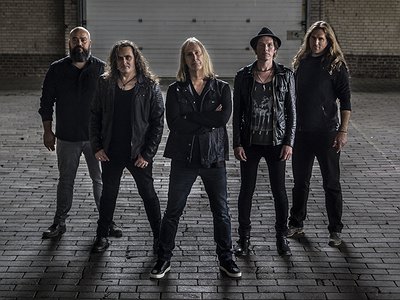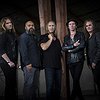Name: Kayak
Interviewee: Ton Scherpenzeel
Occupation: Keyboarder
Current Release: Seventeen on InsideOut Music
Recommendations: I can only say what appeals to me and I am not a very modern guy. The series of historical novels by Monaldi & Sorti, for instance (Imperatur, Secretum, a.o). They are placed in the same period of time as some of my favorite composers: Lully, Bach. In that respect, I would recommend the movie Le Roi Danse, or Tous Les Matins Du Monde. I love French movies in general, but in combination with Lully’s music, it is captivating. To me, that is.
Website / Contact: If you enjoyed this interview with Kayak, there is plenty more information on the Kayak website.
When did you start writing/producing music - and what or who were your early passions and influences? What what is about music and/or sound that drew you to it?
My mother gave me my first piano ‘lessons’ when I was 6 or 7 years old. I was a reluctant pupil, never really studied. Still don’t. I preferred to improvise. I got into pop music at the age of 12, 13, after I heard "She Loves You" by the Beatles. I made my own top-40 for quite a few years, listening to Radio London and Radio Caroline. British bands like the Beatles, Who, Kinks, Move, Jimi Hendrix, and American pop music as well: too many to mention. When Kayak started, in the early seventies, it was Yes, of course. In ’74 I heard Judee Sill. She did not make many albums, but became a big influence on my sense of melody. I couldn’t really identify with her religious side, though her lyrics are beautifully written- but her music held an undefined sort of longing that appealed to me. What draws a person to music, except for the obvious? Music is like another world for me. Much nicer than the real world because it directly connects to the heart and is uncompromised. Call it an escape if you will. Of course until you become a pro, then the bargaining begins because you have to make a living.
For most artists, originality is first preceded by a phase of learning and, often, emulating others. What was this like for you? How would you describe your own development as an artist and the transition towards your own voice? What is the the relationship between copying, learning and your own creativity?
That was the same for me. I will not deny that Yes was a big influence on me and Kayak in the beginning, but we often opted for the shorter format of songs. That’s where we found our strength. Also, we weren’t good enough, technically, to do what Yes did. We had just begun and were 19, 20 years old. But what does one know then, at that age? Youth and ignorance makes you try things without fear of failing. It was a good starting point and helped us find and develop our own style. Nowadays with all these tribute bands, it is different. They copy, and do that very well - but there is no intention to grow, to become a better version of yourself. It is bringing back the past, because the old bands die out yet people still want to hear it. A market, a big market. In our early days, we were also copying (the style I mean) not to revive the past but to find our own future.
What were your main compositional- and production-challenges in the beginning and how have they changed over time?
We obviously made a lot of mistakes along the way. Some of which may sound intended but they weren’t. We never considered, for instance, the right key for our first singer Max Werner’s vocal range. Sometimes he had to use his falsetto, because the tracks were already recorded and we could not or did not want change the key anymore. But at the same time it really worked, because it was very recognizable and became a part of the band sound of the early years. That’s a beginner's mistake. Also, having 24 tracks at your disposal requires some restraint, but we were like kids in a candy store then. I always felt Pim Koopman was the better producer of us two. Very detailed he was and he could still see the bigger picture. Not me. I was often so absorbed and distracted just by the song itself. I think I learned from him, but I still find it difficult. All those choices you have to make from the very beginning, writing the song till the final mastering.
What was your first studio like? How and for what reasons has your set-up evolved over the years and what are currently some of the most important pieces of gear for you?
I really did not have my own studio until some 25 years ago, and it got serious with Atari and ADAT. And it still is a modest home studio, that I use for preparing and programming. I only record keyboards, bass and some vocals there.
How do you make use of technology? In terms of the feedback mechanism between technology and creativity, what do humans excel at, what do machines excel at?
Humans are there for the creativity, machines are there to help them recording them, but that’s stating the bloody obvious isn’t it. I can easily work with Protools and do basic recordings, but I am not an engineer. The greatest advantage of the new technology for me is that I can record many ideas and come back to them later. See what was left unfinished, and then continue. Or do different versions of a song and retrieve them when I want to. But basically what I am doing is just postponing decisions. I am pretty impatient when it comes to recording ideas, so I want to work quickly to keep the flow of creativity going. I find myself having to correct many things later on in the process, because of the speed of the creating process. Since digital you can always add a track, change or adapt what you have. Like with a word processor, the book is never really finished because it is so easy and tempting to change something, even at the last moment. In the ‘old days’, you would do a mix and perhaps a couple of times, with like 5 pair of hands on the mixer. That final and exciting moment of ‘that’s the one, that’s the mix’ does not exist in the digital world. I miss that, sometimes.
Production tools, from instruments to complex software environments, contribute to the compositional process. How does this manifest itself in your work? Can you describe the co-authorship between yourself and your tools?
In the previous answer that is already partly explained. But of course I am inspired by great sounds. One great sounding patch can convince me to buy a keyboard. And it is great to be able to lay down a basic rhythm track and create a song from there. I never had a drummer at my disposal at home, and it really helps. But it never gets so far as that the sound is the song to me. If the song sucks, a great sound doesn’t save it for me.
Collaborations can take on many forms. What role do they play in your approach and what are your preferred ways of engaging with other creatives through, for example, file sharing, jamming or just talking about ideas?
I prefer working alone, but of course when you are in a band that only works up to a certain point. Technology and the possibility to communicate without physically being together is a vital part of the way we record nowadays. I’d rather have Marcel Singor, our guitar player trying out stuff at his home studio, I don’t need to be there to watch him do it. It’s more comfortable for him too. That way he can make it perfect, the way he wants without me looking over his shoulder he will send me the result via mail or whatever. It is important that I give him enough feedback, or explain what I’d like beforehand. But when you know and trust someone musically, this is the best and most practical way to work I think. We’re not the sort of band that is jamming in the studio. I write, I arrange, I prepare. But still everyone has a lot of freedom within that confinement.



